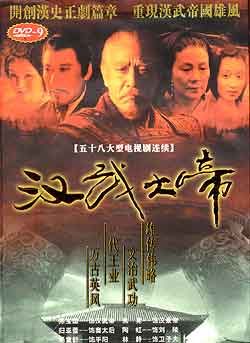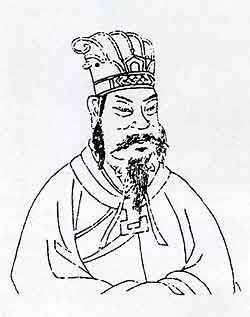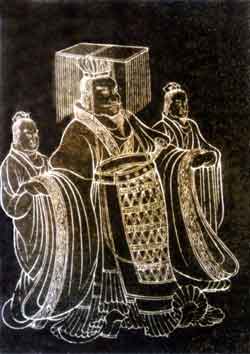|
|||||||||
|
ARTICLESThe Rebirth of Serious Historical Drama? Fig. 1 Cover of DVD series of Hu Mei's Han Wu Dadi.
Fig. 1 Cover of DVD series of Hu Mei's Han Wu Dadi.
Does Han Wu Dadi (Great Emperor Wu of the Han) (Fig. 1), Hu Mei's latest TV costume drama, represent the rebirth of serious historical drama that has a measure of political import, or is this latest contentious period piece just another soap? Although the series proclaims itself to be based on the writings of the ancient historians Sima Qian (author of Shi ji) and Ban Gu (Han shu), and the historical consultant for the show is listed as Qiu Shi—a penname that suggests an attitude keenly in tune with current Communist Party policies—many critics believe that Emperor Han Wudi, as depicted by Hu (an often forgotten and feisty female member of the so-called 'Fifth Generation' of China's film-and-TV talents), is anything but a paragon for China in this day and age.  Fig. 2 Traditional wood-block portrait of Han Wudi.
Fig. 2 Traditional wood-block portrait of Han Wudi.
Chinese individuals, regardless of their level of education, have a remarkable sense of the nation's history, one that is often as profound as it is baffling to non-Chinese. There are perhaps many reasons for such a familiarity, for the Han Chinese have, in general: a language that enshrines historical references in daily speech; a penchant for complex history-based story-telling; a passion for long, episodic novels that seem to flow endlessly; a strong sense of family and hence of remembered tradition; an enthusiasm for heroism exemplified by both political-military heroes and 'chivalrous' knights-errant; a sense of how easy it is to be a victim of some historical injustice; or being the victims of a government that stresses the need to overcome historical injustices and support present political contingencies at all costs. All or only some of these reasons might explain why people are imbued with a strong sense of history, or at least the history of China. Historical events and incidents are often located in terms of dynastic eras or reign periods, and not by locating them in a certain years. This all goes to reinforce a sense of chronology and sequence, and of repetition. Despite this, however, the majority of Chinese do not read histories as such (in particular dynastic histories); but they are voracious fans of historical novels and historical dramas. For decades, the historical drama was increasingly overshadowed by films and in recent decades such films have, on TV at least, increasingly gave way to soaps operas of one ilk or another. The level of historical awareness, or the appetite for things historical, however, still remain high, which does suggest other factors are at work.  Fig. 3 Rubbing of traditional portrait of Han Wudi.
Fig. 3 Rubbing of traditional portrait of Han Wudi.
Great Emperor Wu of the Han is probably the most lavish TV costume drama made to date in China, and definitely the most expensive, with China Central Television (CCTV) investing RMB 50 million yuan in the 58-episode series. Netting more than RMB 120 million yuan in advertising revenues, not to mention an undisclosed figure for the VCD/DVD rights, CCTV is certain to encourage more producers to follow in Hu Mei's footsteps and produce serious costume dramas. Audience numbers were high, although the series did not top the record of 19.8% previously set for a period drama by Yongzheng wangchao (The Yongzheng Court), made in 1997, also directed by Hu Mei and regarded as having a thinly-veiled political subtext. However, the audiences found the diluted historical realities and politico-philosophical discourses in that series somewhat more palatable than the disturbing reconstructions of Zhou dynasty life that led to another show tangentially based on Dong Zhou lieguo zhuan (A history of the states of the Eastern Zhou) being taken off screen in the late 1990s. In that doomed production, literature, art and archaeology contrived to paint a portrait of the society which produced Confucius as one based on human sacrifice and live interment. Han Wudi, the emperor who reigned from 140 to 87 BCE and is the subject of Hu Mei's series, has an image little obscured by literature. The fantastic tales engendered in his name in the Tang dynasty and earlier have no currency today. Unadorned portraits revealing little personality are the only images that have come down through rubbings and prints in ancient books. (Figs. 2 & 3) Moreover, archaeologists have done little to flesh out the picture, despite the fact that Maoling, Emperor Han Wudi's mausoleum near Xingping in Shaanxi province, is one of the few imperial tombs to have been excavated since 1949. While that excavation yielded objects (Fig. 4) which were replicated in the TV series as props, the historical record was little changed. Although Hu Mei stressed to journalists that she based her series on Sima Qian's account, she in fact had few written sources. This year marks the 2,150th anniversary of Sima Qian's birth, and an international symposium was held in Xi'an in August to mark that event. However, the scholars from the US, Japan, Taiwan and elsewhere attending the symposium had far fewer novel contributions to make to the interpretation of Emperor Han Wudi by Sima Qian than did Hu Mei herself.  Fig. 4 Incense burner made from gilt-and-silver coated bronze unearthed from accompaniment burial pit at Maoling, mausoleum of Han Wudi, near Xingping, Shaanxi.
Fig. 4 Incense burner made from gilt-and-silver coated bronze unearthed from accompaniment burial pit at Maoling, mausoleum of Han Wudi, near Xingping, Shaanxi.
The first episode opens with an anachronistic conceit in which we witness a confrontation between Sima Qian, the Grand Historian, and either Emperor Jingdi or Emperor Han Wudi himself—Hu Mei does not make this clear, as the action of the TV drama opens in the 1st year of the Qianyuan reign of Emperor Jingdi (156 BCE). In this imaginary encounter the emperor makes it clear that Sima Qian has misunderstood him, and that the Grand Historian's appraisal and analysis of his royal career are flawed. This vignette highlights the dilemmas presented by historical writing and signals to the viewer that this series, while based in part on Sima Qian's account, will also correct errors in his interpretation of history. Amusingly, Sima Qian also sports a moustache, a simple slip that would indicate that Hu Mei has chosen to ignore the fact that Sima Qian had been punished by castration well before he completed his famous historical account. If Sima Qian's hormones (or lack thereof) function as something of a digitized deus ex machina, the numerous anachronisms in the series also provide considerable mirth. The use of chairs, saddle iron and paper, can, however, all be forgiven, and the full orchestral sound track is strangely appropriate. Many of the re-enactments in the drama, however, reveal felicity to vision of how "the hundred entertainments" (baixi,), a proto-football match, a dramatised exorcism (nuoxi), a Xiongnu encampment, or an imperial wedding might have looked, but viewers will be brought rapidly back to the present by the Canto-pop song that celebrates the first love of the young emperor and the Louisiana-style black vocals which provide the sound-track for the Xiongnu invocation of the Kunlun deity. Three pompous claims for Emperor Han Wudi's historical importance headline each episode. We read that: "He established respect for a nation that the nation had previously not known"; "He gave an ethnic group the self-respect that would serve it for eternity"; and, "His dynasty became the name by which a people would be always known." Thereby Hu Mei is making it clear to her audience that this is a departure from the xishuo or entertainment-oriented interpretation of events which has come to predominate on China's big and small screens. And a number of scholars agree. Zhang Yiwu, a lecturer at Peking University best known for his po-mo (post-modernist) lucubrations, has argued that the depiction of Han Wudi, and the emphasis on his attention to the frontier problem posed by the Xiongnu, conforms with a vision of a Chinese leadership appropriate to the status of a rising power. However, other writers dissent, asserting that, despite his military campaigns, Han Wudi achieved little of lasting value. It is surprising how much debate the series occasioned in the popular press, as well as in scholarly journals. What is, however, most interesting about the debate is that few participants in it accord historical dramas the status they commanded in the period from the 1950s through to the 1970s, a time when historical plays echoed intense political struggles taking place in the central government. Moreover, most academic contributors to the present debate have been quick to point out that they don't get their history from watching TV. [BGD]
|